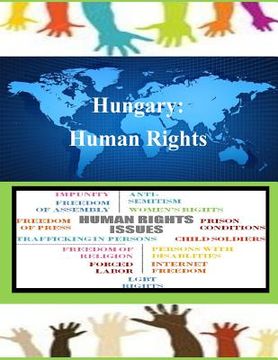Share
Hungary: Human Rights (in English)
United States Department Of State (Author)
·
Createspace Independent Publishing Platform
· Paperback
Hungary: Human Rights (in English) - United States Department of State
$ 10.36
$ 12.95
You save: $ 2.59
Choose the list to add your product or create one New List
✓ Product added successfully to the Wishlist.
Go to My WishlistsIt will be shipped from our warehouse between
Monday, July 15 and
Tuesday, July 16.
You will receive it anywhere in United States between 1 and 3 business days after shipment.
Synopsis "Hungary: Human Rights (in English)"
Hungary is a multi-party parliamentary democracy. The unicameral National Assembly (parliament) exercises legislative authority. Parliament elects the president (the head of state) every five years. The president appoints a prime minister from the majority party or coalition following national elections every four years. In 2012 a single round national election system replaced the previous two-round system. The most recent parliamentary elections (in 2010) were assessed as free and fair. The conservative Fidesz-Christian Democrat coalition won a two-thirds parliamentary majority. Fidesz's prime ministerial candidate, Viktor Orban, took office in 2010. Authorities maintained effective control over security forces. There were reports that security forces committed human rights abuses. Among the most important human rights problems during the year were societal discrimination and exclusion of the Roma (also known as Romani), and anti-Semitism. Discrimination continued to significantly limit Roma access to education, employment, health care, and social services. The government continued to use its two-thirds parliamentary majority to implement constitutional reform. It adopted the Fourth and the Fifth Amendments to the Fundamental Law (constitution). The Fourth Amendment in particular attracted intense international criticism and further reinforced concerns that checks and balances were eroding. Human rights NGOs stressed that political liberties and their guarantees have been subject to systematic curtailment in the past three years and that the Fourth Amendment was a new component of this process. The Fifth Amendment partially responded to international criticism, but concerns remained that provisions contained in the new legislation could undermine equal treatment of religious groups and media pluralism. Other human rights problems during the year included police use of excessive force against suspects, particularly Roma, laws that caused concerns over the powers of the media regulatory authority which could encourage self-censorship, government corruption, societal violence against women and children, sexual harassment of women, anti-Semitic assaults and vandalism, a politically determined process of recognizing churches, and trafficking in persons.
- 0% (0)
- 0% (0)
- 0% (0)
- 0% (0)
- 0% (0)
All books in our catalog are Original.
The book is written in English.
The binding of this edition is Paperback.
✓ Producto agregado correctamente al carro, Ir a Pagar.

